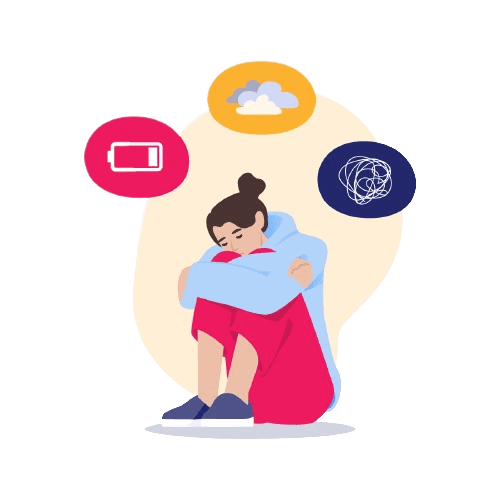Social Anxiety Assessment
3 Min Free Social Anxiety Assessment
What is Social Anxiety?
Social anxiety, also known as social anxiety disorder (SAD) or social phobia, is a mental health condition characterized by an intense and persistent fear of social situations or performance situations where an individual may be observed or evaluated by others. People with social anxiety often have an overwhelming concern about being embarrassed, humiliated, or judged negatively by others.
Social anxiety can significantly impact an individual’s quality of life, relationships, and career or educational opportunities if left untreated. It often begins in adolescence or early adulthood and can be accompanied by other mental health conditions, such as depression or substance use disorders.

Symptoms of Social Anxiety
The symptoms of depression can vary from person to person, but they often include:
- Intense fear of social situations
- Excessive self-consciousness
- Fear of negative evaluation
- Avoidance of social situations
- Rapid Heartbeat, Sweating, & Trembling
- Excessive Self-Criticism
- Difficulty with conversations
- Performance anxiety
- Emotional distress

Who Can Benefit From This Social Anxiety Assessment?
The social anxiety assessment can benefit individuals who suspect they may be experiencing social anxiety symptoms or have concerns about their social interactions. It provides a preliminary evaluation of social anxiety-related experiences, helping individuals gain insight into their condition. The assessment can be useful for those who feel intense fear or distress in social situations, struggle with initiating or maintaining conversations, experience physical symptoms, avoid social interactions, or feel emotionally distressed.
However, it is important to note that the assessment does not provide a formal diagnosis but can serve as a helpful screening tool. Seeking professional help from a mental health provider is advised for a comprehensive evaluation and appropriate treatment options.
Types of Social Anxiety Assessment
Liebowitz Social Anxiety Scale (LSAS):
The LSAS is a widely used self-report questionnaire that assesses social anxiety and avoidance across a range of social and performance situations. It evaluates both fear and avoidance ratings associated with specific situations.
Social Phobia Inventory (SPIN):
The SPIN is a self-report questionnaire designed to assess the severity of social anxiety symptoms. It includes items related to fear, avoidance, and physiological discomfort experienced in social situations.
Social Interaction Anxiety Scale (SIAS):
The SIAS is a self-report scale that measures anxiety specifically related to social interactions. It focuses on anxiety experienced during conversations, meeting new people, and assertiveness.
Mini-Social Phobia Inventory (Mini-SPIN):
The Mini-SPIN is a brief self-report questionnaire used to screen for social anxiety disorder. It consists of three items that assess symptoms related to fear and avoidance of social situations.
Social Anxiety Questionnaire for Adults (SAQ-A30):
The SAQ-A30 is a comprehensive self-report measure of social anxiety symptoms in adults. It assesses various dimensions of social anxiety, including fear, avoidance, and anticipatory anxiety.
Clinical Interviews:
Mental health professionals may conduct structured or semi-structured clinical interviews to assess social anxiety symptoms. These interviews involve a systematic assessment of social anxiety-related experiences, functioning, and impact on daily life.
Treating Social Anxiety
Treating social anxiety typically involves a combination of therapeutic approaches tailored to the individual’s needs. Here are some common treatment options:
- Cognitive-Behavioral Therapy (CBT): CBT is a widely used and effective approach for social anxiety. It helps individuals identify and challenge negative thought patterns and beliefs associated with social situations. Exposure therapy, a component of CBT, involves gradually and systematically facing feared social situations to reduce anxiety.
- Social Skills Training: Social skills training focuses on improving interpersonal skills and enhancing social confidence. This may involve role-playing, assertiveness training, and learning effective communication techniques.
- Mindfulness-Based Therapies: Mindfulness-based therapies, such as Acceptance and Commitment Therapy (ACT), can help individuals observe and accept their anxious thoughts and feelings without judgment. These approaches can promote psychological flexibility and reduce the impact of social anxiety.
- Medication: In some cases, medication may be prescribed to help manage social anxiety symptoms. Selective serotonin reuptake inhibitors (SSRIs) and benzodiazepines are commonly used medications. It’s important to consult with a healthcare professional to discuss the potential benefits and risks of medication.
- Support Groups: Participating in support groups or group therapy with others who have similar experiences can provide a supportive and non-judgmental environment for individuals with social anxiety. It allows for shared experiences, learning from others, and building social skills in a supportive setting.
- Lifestyle Changes: Engaging in regular exercise, practicing stress management techniques (such as deep breathing or progressive muscle relaxation), and maintaining a healthy lifestyle can contribute to overall well-being and help manage anxiety symptoms.
- Self-help resources: There are self-help books, online resources, and mobile applications available that provide guidance and strategies for managing social anxiety. These can be used in conjunction with therapy or as a supplement to treatment.
Treatment for social anxiety should be individualized, and it is important to work closely with mental health professionals to develop a personalized treatment plan. It may take time and practice to see progress, but with proper treatment and support, individuals with social anxiety can experience significant improvements in their symptoms and overall quality of life.

